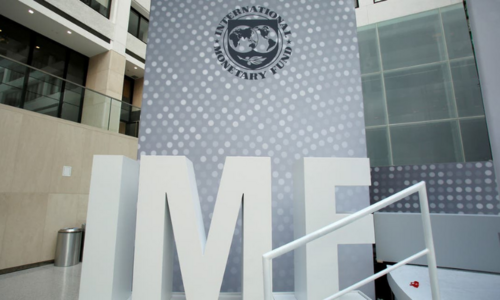ISLAMABAD: The Ministry of Finance continues to keep mum about the outcome of its long negotiations with the International Monetary Fund (IMF) for the revival of its $6 billion Extended Fund Facility (EFF) as authorities reported to have received about $3.2bn in foreign assistance in the first quarter of the current fiscal year.
Read more: Pakistan-IMF talks remain inconclusive, so far
Informed sources said the extended talks between the two sides lasting almost three weeks remained tense in Washington and authorities were given tough targets to complete before a memorandum of economic and financial policies (MEFP) could be finalised. The programme remains “in recess” since April this year and the sixth review that should have been completed by June remains open while the next review has also become due by now under the revised time table.
Fund looking forward to continued discussions on policies, reforms
The talks that originally began on October 4 through virtual interaction and were scheduled to conclude by October 15 prolonged until October 23 without anything to publicly report about, said an official. There is a list of ‘do more’ actions that authorities would need to sort out with various stakeholders, he said.
Starting from a schedule of tariff and structural adjustments in the gas and power sector to a series of revenue measures and from strengthening of regulatory institutions including the central bank to complete transparency in public sector financial flows, there is a lot that needs to be done to put the programme on normal course and ensure flows from the fund, the official said adding specifics were still fluid to be discussed.
Secretary Finance Yousaf Khan who had been engaged with the IMF since early this month declined to engage with local journalists in Islamabad while Adviser to the Prime Minister on Finance Shaukat Tarin has also maintained silence on the outcome of his talks with the IMF staff mission. IMF’s resident representative in Islamabad Teresa Dabán Sanchez, however, said on Monday that the fund team remained engaged with Pakistani authorities on moving forward the work agenda. She said the fund was “looking forward to continued discussions with the Pakistani authorities on the set of policies and reforms that could form the basis for the completion of the sixth review under the EFF”.
Read more: Shaukat Tarin leaves US without concluding IMF negotiations
Meanwhile, the Ministry of Economic Affairs (MEA) on Monday said it received a total of $3.2bn foreign assistance from different sources during first three months (July-September) of the current fiscal year, showing an increase of $826 million in September alone.
This included about $3.1bn of foreign loans and about $107m of grants in first three months. Major inflows in September included about $180m from Asian Development Bank and about $445m from International Development Assistance from the world bank. Total bilateral loans in first three months amounted to $110m, $1.6bn from multilaterals, $1.04bn from international bonds and about $458m in commercial loans from banks. Commercial loans included $215m from Dubai Bank, $182m from Standard Chartered Bank London and $61m from Ajman Bank.
The MEA said the government had budgeted $14.088bn estimates of foreign assistance for the entire current financial year including $13.871bn loans and $217.44m grants.
Meanwhile, the finance ministry has reported that net addition in external debt and liabilities during the tenure of the current government amounted to $27bn. In a written statement before the National Assembly, the finance ministry said that external debt and liability numbers were published on quarterly basis. Accordingly, total external debt and liabilities at end-June 2018 was $95bn which increased to $122bn at end-June 2021.
The finance ministry also reported that total public debt stood at Rs39.859 trillion at end-June 2021 and the per capita debt is around Rs188,000 at present.
The ministry, however, advised that instead of measuring debt per capita a better way to measure level of debt was through Debt-to-GDP ratio as used by countries throughout the world as this ratio accounts for the size of the economy compared to population levels.
The ministry said the Pakistan had witnessed one of the smallest increases in its debt to GDP ratio during pandemic. Global public debt to GDP ratio increased by 13 percentage points, whereas, Pakistan’s debt to GDP ratio witnessed minimal increase of 1.7 percentage points in 2019-20.
Published in Dawn, October 26th, 2021




































